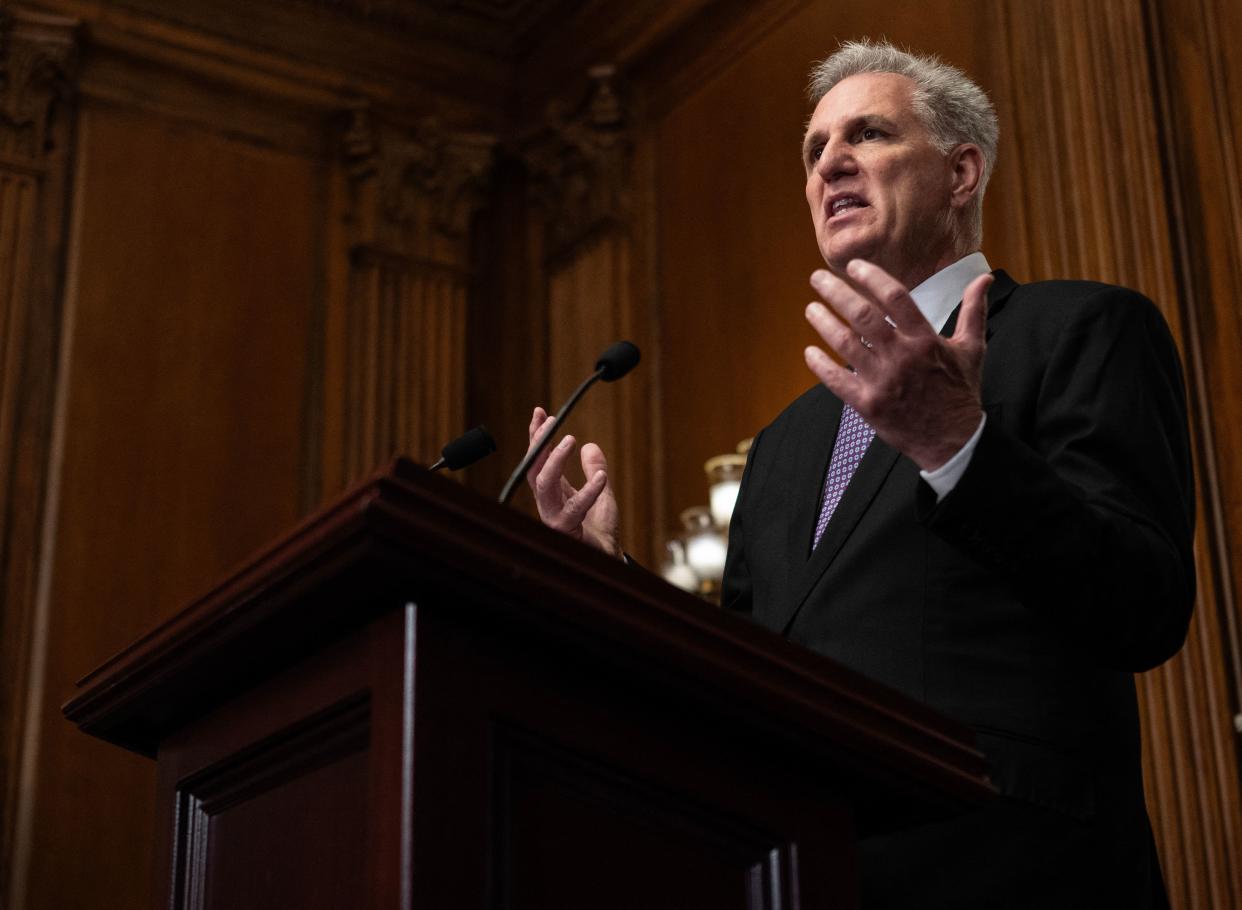Kevin McCarthy let the House win

- Oops!Something went wrong.Please try again later.
In hindsight after this past year, it seems inevitable that California Republican Rep. Kevin McCarthy's nearly two decades in Congress would end like this; with a rose-colored resignation letter published in a friendly newspaper and barely hinting at the turmoil and humiliation that that defined his tenure — and ultimate downfall — as the 55th Speaker of the House of Representatives. Insisting that "no matter the odds, or personal cost," the Republican "did the right thing," McCarthy's announcement that he has "decided to depart the House at the end of this year to serve America in new ways" was, in many ways, a microcosm of his brief stint as speaker: forward-looking, self-satisfied, and conspicuously unwilling to acknowledge the very public chaos that dogged him from the moment he lost his first of 15 ballots for the speaker's gavel this past January.
With his speakership over, and his time in Congress drawing to a close, McCarthy's legacy as a lawmaker is in many ways a "tragic" one, observed one New York Times reader, defined by the way he "contorted himself to achieve power, and like many who are similarly obsessed [...] has nothing to show for it." Longtime ally Rep. Darrell Issa (R-Calif.) was more charitable, telling the Los Angeles Times last week that McCarthy had "led us to victory. He led us to the majority. He led us well in the majority as our speaker. He's done really great work."
After 17 years in office, the truth for McCarthy may lie somewhere in the middle.
The last of the 'Young Guns'
For much of his early time in Congress, McCarthy was a rising star among House Republicans alongside fellow former Speaker Paul Ryan (R-Wisc.) and Majority Leader Eric Cantor (R-Va.), "a generation known informally as the 'Young Guns,'" according to The Washington Post, which noted the trio's pledge to "to usher in a 'new generation of conservative leaders.'" But while Ryan and Cantor were ultimately "pushed out by the far-right flank," McCarthy held on, and continued to rise through the GOP ranks as minority leader and majority speaker alike "by transforming himself to appeal to the party's most conservative elements, and by largely remaining loyal to [former President Donald] Trump."
McCarthy's "most lasting legacy" may ultimately be "the political rehabilitation of former President Donald Trump" following the Jan. 6 Capitol riot, predicted HuffPost's Arthur Delaney and Liz Skalka. After initially blaming Trump for the violence, then-Minority Leader McCarthy "changed his tune, blaming 'everybody across this country' for the attack and traveling to Trump's Mar-a-Lago resort" as a show of support for the former president.
Pre-speakership consolation of Trump notwithstanding, McCarthy's "quest to seize the House speakership, and his catastrophic downfall from the post, will be one of the chief markers of his legacy," Rolling Stone's Nikki McCann Ramirez wrote, noting that this past year's triumph and defeat had been McCarthy's second attempt at the speakership, following a failed bid in 2015 while serving as House majority leader. To ultimately succeed after 15 contentious ballots in January 2023, McCarthy helped sow the seeds of his own ousting by promising a suite of concessions to his party's ultra-conservative wing including granting a single member the ability to begin the process of removing him from the speakership, as eventually occurred in October.
'Delivering results for the American people'
In his resignation letter, McCarthy bragged that his time in office had been spent "delivering results for the American people." Those results this year included raising the debt ceiling and narrowly averting a government shutdown — a negotiation opposed by the far right flank of his own caucus, which ultimately doomed his speakership.
McCarthy's rise "to the top of the party" was fueled in part "by his prolific fundraising" according to Bloomberg. In just his first six months as speaker, McCarthy had raised $62.5 million for his party, writing in a statement to CNN this July that the public had responded to his successes "with an outpouring of support to advance this mission."
While McCarthy has played coy about specifics for his post-congressional life, he has hinted that he will remain involved in the GOP, insisted in his goodbye letter that he was "committed to lending my experience" to helping "recruit our country's best and brightest" into politics.

